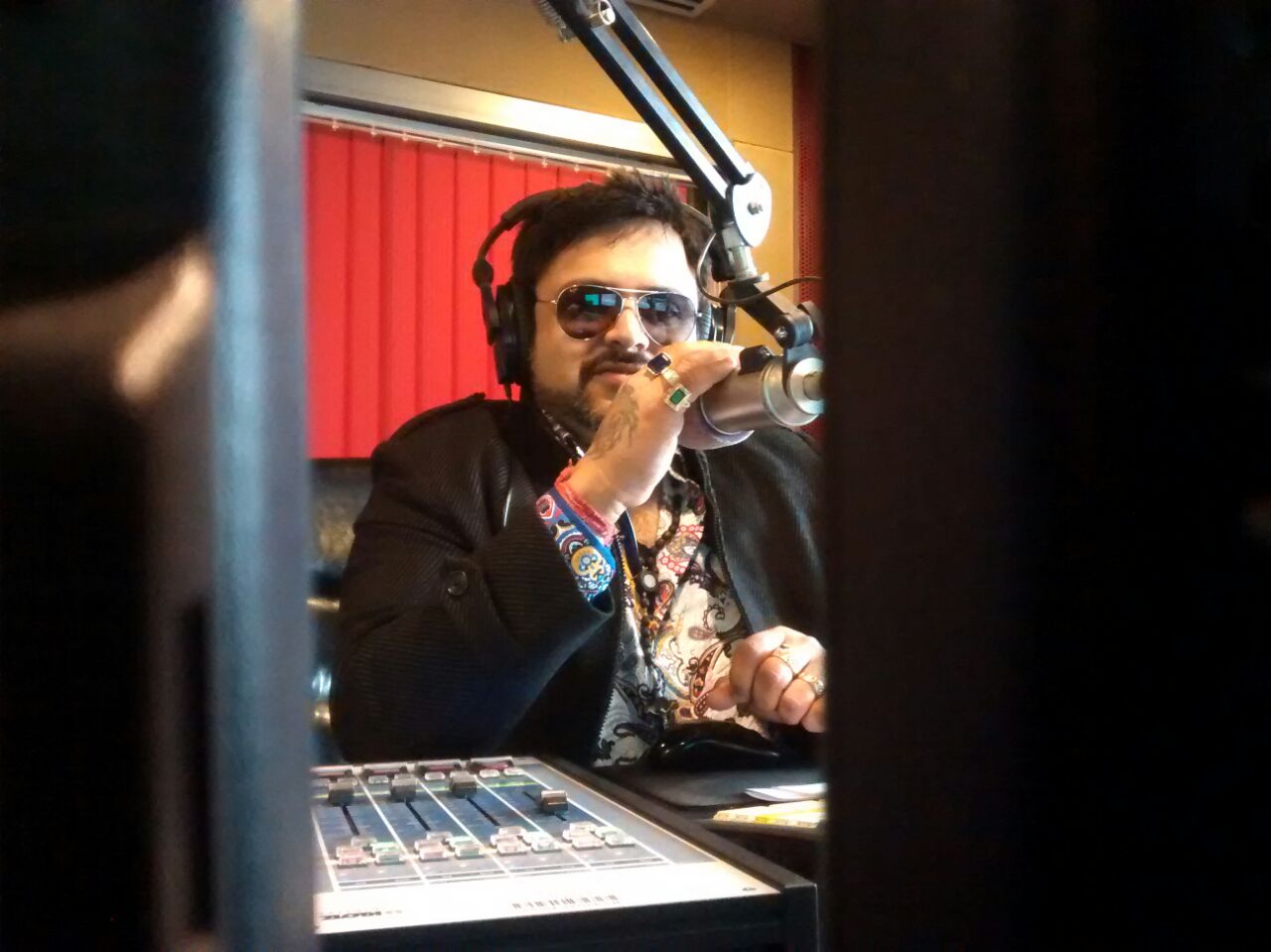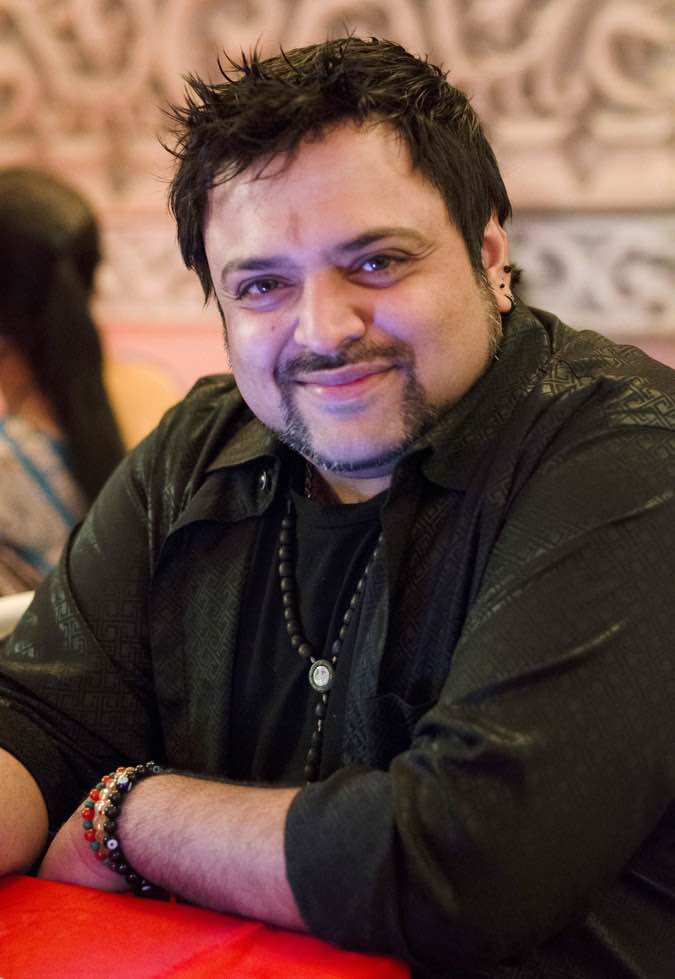
When I started out, most people couldn’t make a living out of radio – you did fewer shows and it was more like a hobby that you could pursue. But I’ve stayed on because I absolutely love connecting with people from all over on my show.
He always wanted to be an actor – a Bollywood villain, to be precise. They have “more character,” he says, and who can argue with that? No wonder then that Jonathan Brady transformed himself into Jonathan Nitin Brady A.K.A. Khurafati Nitin. Or the voice that has been waking up Delhi for years together, with as much infectious energy as rogue charm and a delicious wit to boost. In his most recent gig on radio, his voice accompanies Delhi on their evening drives back home. Starting off his radio career 14 years ago, with All India Radio “because people around kept telling me that I should give it a shot”, Nitin found a calling the city is grateful for – when he plays a prank, you listen; when he urges you to think about issues, you do. Even the most over-played song finds new meaning when he’s on air! No wonder then that Khurafati Nitin is India’s most awarded Radio Jockey today, with a roster that includes the RAPA award, the Media Federation of India Award, the Indian Achiever’s award for the best Radio jockey across India 2012, and 2014 for his CSR initiatives on radio, to mention a few. And the acting ambitions have entered a new innings too – Nitin now conducts regular acting, voice and theatre workshops at the (you guessed it!) Khurafati Nitin School of Drama.
 Could you tell us about your education, and how you started out on radio?
Could you tell us about your education, and how you started out on radio?
I did my schooling from St Columba’s, and then English Hons from Kirori Mal College, Delhi University. I never wanted to be an RJ, it was only because people around kept telling me that I should, did I give it a shot. I always wanted to be an actor, I did my first theatre production when I was just four.
When I started out, most people couldn’t make a living out of radio – you did fewer shows and it was more like a hobby that you could pursue. But I’ve stayed on because I absolutely love connecting with people from all over. On my shows, I talk to people, understand their problems and basically give them a vent to let out the steam and relax. That’s a great feeling.
What sort of education is an absolute essential for your profession? And what kind of internship or experience would you recommend to a young person considering this line of work?
There isn’t a minimum qualification required for becoming a radio jockey, but over the years, most RJs I’ve met are at least graduates. Interning with radio stations today is much easier than it was 10 years ago, and one should definitely do that. I think you just need to have the zeal and desire to pursue radio as your career and need to convince your interviewer that you’re really, really keen, and voila! You’re all set to be an intern and take it from there.
A roadblock just proves that there is a road ahead, so getting past it becomes essential.
If you had to draft an elevator pitch for your profession, what would it be?
Each time I put the mic on in my show, that minute or so I talk for, becomes my elevator pitch. So, I’d say my elevator pitch is different each time.
What are the new trends you notice that are changing the complexion of your profession? And how do you see this profession faring, say 20 years down the line? Show me the money!
Radio is a very dynamic medium and therefore demands constant change, constant renewal. As a radio jockey, it is very important to keep re-inventing yourself. Listeners do you a favour by tuning in to your show, so you need to return the favour by entertaining them and giving them something new every time they tune in. Advertisers today see the potential and reach of radio, and because it is a local and private medium, it permeates deep inside. Radio has immense opportunities for advertisers and it can be the deciding factor in a consumer’s mind when they’re about to make that purchase, because radio travels with you – When you’re driving to a mall to buy a pair of jeans or heading off to book an apartment, you tune in and just then hear an ad about the right jeans to buy, or a fantastic sounding apartment. Radio is here to stay, but it is so dynamic in nature that I would say it’s impossible to predict how things will shape up in the next two years, let alone 20.
What is the toughest thing about being an RJ?
In these super hectic times, when listeners tune in, they expect the RJ to humour them, to make that listening experience pleasurable and happy, so it is every RJ’s duty to make sure that he/she doesn’t carry his/her personal tensions and problems on air. That is tough at times, because after all we’re humans and there are days when you’re not in the best of moods, but over a period of time, you learn to muster the courage to put a smile in your voice come what may.
What is most rewarding about your job?
When a listener calls and says you brought a smile to their face – that is the biggest reward.
It is very normal to be confused at the start of your career. But being confused simply means you have the luxury of choice.
When we’re in school, we’re told cheating is bad – ‘Don’t talk to each other, don’t discuss.’ And then as we come out of it, we begin to realize that there’s something called “collaborative thinking” and it’s not bad! What’s your opinion on collaborative thinking?
Collaborative thinking is healthy, but it is also important to inculcate the feeling of being independent and self-sufficient in students, so that if the need arises, they may hold the bull by its horns on their own.
 How do you overcome roadblocks in your profession?
How do you overcome roadblocks in your profession?
Roadblocks are learning experiences, one should learn to take them with a pinch of sugar! 🙂 But seriously, a roadblock just proves that there is a road ahead, so getting past it becomes essential. I’m very spiritual, so if I’m stuck in life, I just spend some time with myself.
Did you ever want to change the world?
I’ve always wanted to, I still want to. There’s so much violence around us; the only stories you read in the newspapers are those that either anger you or make you sad.
If you could do some time-travelling and go back to meet yourself at 15, 20, 30, what would you say to your selves then?
At the risk of sounding clichéd, I seriously would not want to change anything in my past. My family has always supported me in everything I’ve done and I’m happy with the career choices I’ve made.
Describe a typical, business-as-usual, day at work.
My day starts at around 5.30 in the morning. The first half of the day, I devote to my production house and the latter at Fever 104 FM. The first thing I do every morning is to scan through the newspapers to get a feel of what’s happening because any listener who calls, expects you to know about almost everything, so it’s good to be informed.
Then I head to my personal office where I spend a few hours either teaching acting at The Khurafati Nitin School of Drama or doing audio video production work for clients.
I reach Fever studios by around 4pm and immediately get into a huddle with my producer, assistant producer and interns. We have an hour before the show starts. All the preparation doesn’t happen in that one hour. Before I reach, at 4 pm, my team has already been at work for 3 hours, so they typically start working on the show at 1pm. From 5 to 9pm, I host the show live and 9pm is when I get into the production suites for any other recordings/voiceovers of promos/ads. Then I head home. So my day typically ends at around 11pm.
It is every RJ’s duty to make sure that he/she doesn’t carry his/her personal tensions and problems on air. That is tough at times, because after all we’re humans and there are days when you’re not in the best of moods, but over a period of time, you learn to muster the courage to put a smile in your voice come what may.
Radio has immense opportunities for advertisers and it can be the deciding factor in a consumer’s mind when they’re about to make that purchase, because radio travels with you.
What would your advice be to a young person at the start of his or her career and confused about pursuing passion versus being pragmatic?
It is very normal to be confused at the start of your career. But being confused simply means you have the luxury of choice. So if there are different avenues that you think you could explore, note down the pros and cons of each. Ask yourself if the choice you’re making will keep you sorted and happy for at least the next five years. If the answer is yes, I’d say give it a shot.
What is the kind of supplementary informal learning that gives you an edge on the job? Is there any specific reading that you engage in, Twitter accounts you follow, LinkedIn articles etc., to keep yourself abreast of developments in theatre, anchoring, radio?
As a radio jockey, it pays to be well informed. So I scan through roughly 8 newspapers every day, watch a lot of TV news. Yes, I’m very active on social networking sites, and I get a lot of information from there too.